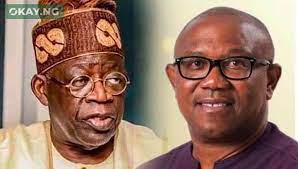.PDP, Labour Party, APM lose
The Presidential Election Petition Court (PEPC) sitting in Abuja has affirmed President Bola Ahmed Tinubu as the winner of the February 25 elections.
The Court dismissed the three separate petitions filed by former Vice President and Presidential candidate of the Peoples Democratic Party (PDP), Atiku Abubakar, the Labour Party and her candidate, Mr. Peter Obi as well as the petition by the Allied Peoples Movement (APM) challenging the outcome of the Presidential poll.
In a Unanimous Judgement by the Five-member panel of the tribunal, led by Justice Haruna Tsammani, the tribunal dismissed the petitions for lack of merit.
The court held that the petitioners could not prove non-compliance, corrupt practices and non-qualification allegations against Tinubu.
“These petitions lack merit and are hereby dismissed.
“I hereby affirm the declaration of Tinubu by INEC, as the duly elected president of Nigeria,” Tsammani held.
The tribunal earlier in the day, struck out a petition filled by the Allied Peoples Movement (APM) seeking the disqualification of President Tinubu over an alleged double nomination of his Vice, Kashim Shetimma, ahead of the election.
The party in petition PEPC/CA/04/2023, held that Shetimma having purchased a nomination form to contest for the office of Senator representing Borno Central Senatorial District, should not turn back to contest for the position of Vice President.
However, the court relied on a letter dated July 6, 2022, tendered by Wole Olanipekun, lawyer to President Bola Tinubu and Shettima at the opening of their defence in the petition, revealing that Shetimma had voluntarily withdrawn his nomination as Senatorial Candidate before allowing himself to be nominated for the office of Vice President.
Justice Tsammani having admitted that letter as evidence in the petition agreed with the submissions of the respondents, that Shetimma had withdrawn his earlier nomination before accepting the office of Vice President.
The court also held that the issue of double nomination is a pre-election matter and a party affair, adding that no other party can interfere in the way and manner another party conducts its nomination.
Justice Tsammani subsequently struck out the name of the 5th respondent, Kabiru Masari, from the petition on the ground that he neither contested in the election nor played any role in the election.
In the Petition by Peter Obi and the Labour Party, the PEPC struck out some paragraphs of their separate petitions containing allegations of irregularities and corrupt practices in the February 25 presidential election.
The paragraphs were struck out on the grounds that they were “vague, imprecise, nebulous and failed to meet the requirements of pleadings”.
Ruling in the preliminary objections filed by INEC, Tinubu and APC, Justice Abba Mohammed, who read the ruling held that “averments” must not leave room for confusion or ambiguity, adding that the aim of pleadings is to avail respondents of the facts of the case so as to prepare adequately.
In a case of alleged malpractices in over 500 polling units, Justice Mohammed held petitioners failed to specify polling units where anomalies occurred or where agents complained of alleged malpractices and irregularities.
In addition the tribunal pointed that amongst the total of over 18, 000 polling units where the petitioners alleged that INEC uploaded “blurred results ” unto the INEC Results Viewing (IReV) Portals, not one polling units was cited.
“They did not specify polling units where election results were not uploaded” or where scores attributed to them was reduced or added to Tinubu”.
“They did not show the majority of votes they claimed they had scored “, the tribunal held, adding that petitioners only make generic allegations of irregularities and malpractices.
Mohammed further faulted the petitioners for relying on a spreadsheet analysis, inspection results and experts reports.
The court held that such documents ought to be served on the respondents to enable them do their own analysis and respond accordingly.
“The spreadsheet report, inspection results and experts reports were not served but only listed as documents to be relied on in adjudicating the petition”, the court held.
Meanwhile, the court declined to dismiss the petition on grounds that Obi and LP failed to join Atiku Abubakar of the PDP, who came second in the February 25 presidential election.
The tribunal held that in an election petition case, the petitioners’ case is between the winner and the electoral body that contested the election.
On Obi’s membership of LP which was being contested by the respondents citing that Obi was still a PDP member, the Court said that Obi and LP certified the provisions of Obi being a member and overruled the objection of the respondents.
The PEPC in addition, struck out the forensic report or evidence provided by the mathematics professor who carried out the analysis because according to the PEPC, his evidence should have been provided at the point of filing the election petition so that the opposition can read them ahead of time
Meanwhile, the Court rejected the testimonies of all witnesses who appeared before it on a Subpoena to testify in the petitions before it as it held that their witness statements were filed out of time.
The court held that all witnesses are the same, whether expert or ordinary witnesses and their statements ought to have been filed alongside the petition within 21 days after the election, as stipulated by law.
Justice Tsammani in a rulling, held that witnesses on Subpoena are not witnesses of the court, but that of the petitioners and the law applies to all of them.
He ruled that Obi’s request for an extension of time to call 10 additional witnesses, not originally part of the Petition, was a “surreptitious” attempt to amend the Petition beyond the legally allowed 21-day timeframe.
The court therefore held that the amendment is impermissible and consequently dismissed the application.
In addition, the court expunged all testimonies and documents tendered by the Subpoenaed witnesses from her records, in accordance with the legal provision outlined in Section 83(3) of the Evidence Act 2011.
The development meant that the candidate of the Labour Party, who called in 13 witnesses, is left with three as 10 of his witnesses appeared in court based on a Subpoena, with their witness statements filed out of time.
Same rulling also applied in the petition filled by former Vice President, Atiku Abubakar and the Peoples Democratic Party (PDP) in the comsolidated petition.
On the issues of Criminal forfeiture of $460,000 by Tinubu in the United States of America, the court dismissed claims that Tinubu indulged in fraud and drug related crimes leading to the criminal forfeiture
Justice Haruna Tsammani in a ruling, held that Mr Peter Obi and the Labour Party (LP), as well as Atiku Abubakar and the Peoples Democratic Party (PDP) failed to produce substantiate evidence to prove the allegations against President Tinubu.
The tribunal stated that the petitioners failed to prove that Tinubu was found guilty of any offence involving any act of dishonesty, adding that evidence before the court showed that the forfeiture order against Tinubu was in a civil and not criminal matter.
The Court therefore held that Tinubu was eminently qualified to contest the February 25 presidential election.
Justice Tsammani agreed with the respondents that Tinubu was neither arraigned nor convicted in the US over any alleged crime to warrant his disqualification.
Besides the court pointed out documents tendered by the respondents confirmed that Tinubu was given a clean bill of health upon an enquiry from Nigeria and is cleared to enter the US at any time.
Further faulting the case of the petitioners, the tribunal held that under Section 269(1&2), provides that such documents must be given under the hand Police official and must be accompanied with a certificate showing that the police officer has powers to sign such documents.
Also the tribunal pointed that even if Tinubu were convicted for the alleged offence, for him to be disqualified from the 2023 election, the purported conviction must take place within 10 years to the election.
Meanwhile, the tribunal has also dismissed claim by Obi and LP that the election that produced Tinubu did not comply with the Electoral Act, 2022, on grounds that results of the election were not transmitted real time to the INEC’s Results Viewing (IReV) portals.
According to the judgment, there is no where in the Electoral Act, that says election must be electronically transmitted for collation.
While pointing out that Sections 14&18 of the Electoral Act provides for the use of the Bi-modal Verification Accreditation System (BVAS) for the purpose of accreditation of voters, Justice Tsammani emphasized that the ” IReV is not a collation system”.
Similarly, in the petition by Atiku and the PDP, the Court expunged several exhibits including witnesses statements tendered by the PDP to establish his allegations of irregularities, malpractices against the February 25 presidential election were rejected and discontenanced by the Tribunal.
Delivering ruling in some objections argued by Chief Wole Olanipekun (SAN) on behalf of Tinubu, Justice Moses Ugoh held that several parts of Atiku’s petition have no legs upon which they can stand and survive, hence, not competent.
Justice Ugo held that Atiku failed and neglected to name places where ballot boxes were snatched, the ways and manners the BVAS machine were manipulated and names of polling boots where alleged malpractices took place.
The petitioner who claimed to have polled majority of lawful votes was said to have failed to state in clear terms, the total lawful votes he claimed to have scored.
The Court held that Atiku alleged that Tinubu did not score majority of lawful votes but refused to make the perceived lawful votes known in his petition to the Tribunal.
Similarly, the Tribunal said that the former Vice President made grievous allegations against Kogi State governor, Yahaya Bello and Chairman of Olamaboro Local Government of Kogi, Friday Adejoh but neglected to join them as respondents in the petition.
Justice Ugoh held that failure to join the governor who was accused of electoral fraud was fatal to the petition because the governor was denied opportunity to defend himself as required by law.
The Tribunal dismissed the the allegations of over voting all over Nigeria by the petitioner adding that such pleadings run foul of the law because the specific places where the alleged over voting took place were not mentioned.
Atiku’s petition was also faulted on the ground that it introduced several facts and allegations in unlawful ways that caught the respondents unaware adding that the tactic employed was unfair and and made him clever by half.
Among the offending new facts said to have been wrongfully introduced by Atiku were the allegations of criminal conviction, certificate forgery, dual citizenship of Guinea made against Tinubu outside the mode of filing petition.
Justice Stephen Jonah Adah who read another ruling on objections against the petition expunged several documents tendered by Atiku on the ground that the exhibits were made during the pendency of the petition.
Also the evidence of several key witnesses of Atiku were expunged from the Court record having been made in manners not known to law.
The Tribunal held that the wrongful mode adopted by the PDP’s presidential candidate in the construction of the petition made several paragraphs of the petition iable for striking out for want of merit.
After delivering the Judgement, Justice Tsammani thanked all parties for their efforts since the beginning of the case as the Judgement brought to an end the sitting of the Presidential Tribunal as regards the February 25 elections.

























